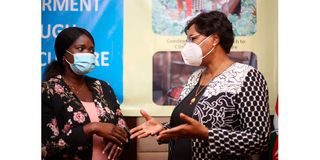UN Women, Canadian High Commission launch project to support female politicians

UN Women Kenya Country Director Anna Mutavati (left) with Gender Cabinet Secretary Prof Margaret Kobia at a past event. Ms Mutavati has said exclusion of women in political leadership denies them a chance to influence making of gender responsive policies.
What you need to know:
- UN Women and Canadian High Commission in Kenya have initiated a $5m worth project, aimed at increasing women’s participation and representation in political leadership and decision-making.
- UN Women Country Director Anna Mutavati, said exclusion of women of in political leadership denies them a chance to influence making of gender responsive policies.
UN Women and Canadian High Commission in Kenya have initiated a three-year $5m worth project, aimed at increasing women’s participation and representation in political leadership and decision-making.
At the end of the Enhancing Women’s Participation in Political Leadership and Decision-Making project launched on Wednesday, the benefitting women will have earned enough knowledge and skills to gain entry into decision making organs, the partners said.
Its strategies of conducting civic education and engaging the men and media, would also result in a country with reduced negative social norms that barricade women from the high table.
Women including the young and those with disabilities from Kericho, Wajir, Kisii, Kajiado, Embu, Samburu and Homa Bay counties are particularly targeted in the project.
United Nations Resident Coordinator in Kenya Stephen Jackson said it is shameful that Kenya lags behind its East African counterparts in representation of women in Parliament.
Gender responsive policies
In the continent, Rwanda leads with 61 per cent, Burundi (38), Tanzania (37), Uganda (35), South Sudan (28) and Kenya (23).
He urged men to play an active role in championing women's inclusion in decision making organs and supporting them to get to those positions.
UN Women Country Director Anna Mutavati, said exclusion of women in political leadership denies them a chance to influence making of gender responsive policies.
“Inclusion of women’s experiences and perspectives in governance and decision making clearly leads to decisions that are more viable and sustainable,” she said.
She said efforts must be made to exceed the 30 per cent quota provided in the Constitution for elective politics.
“This can only be achieved if political parties comply with the two thirds gender rule and support more women in their strongholds,” she said.
Canadian High Commission to Kenya David Da Silva, said the project would not only prepare the women to win elective seats but also enable them perform during their term.
He noted that it is important to have elected women who can set the agenda and enhance achievement of gender equality.
“This project will help normalise participation of women in politics,” he said.
Gender Chief Administrative Secretary Beatrice Elachi, challenged women to compete for the elective seats instead of waiting for nominations.
“We need to commit the political parties that there is no way they are going to nominate women who have not vied…so that we remove the comfort for women to sit and wait (for nominations) ,” she said.





